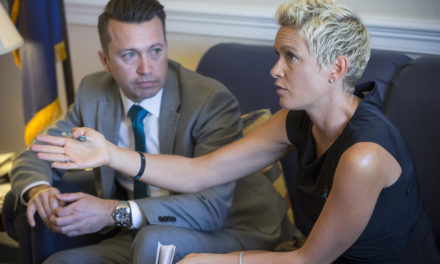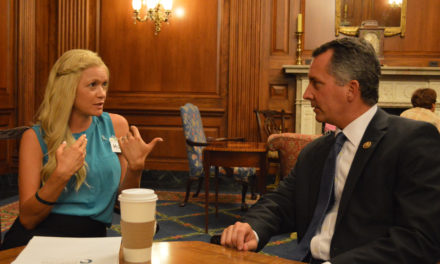So, you’ve got a pelvic mass and you’ve probably Googled “pelvic mass.” My best advice is this: Get off the internet and start talking to your doctor. Now is the time to ask specific questions of your obstetrician/gynecologist.
The first website I visited was the Ovarian Cancer National Alliance to understand my diagnosis and find out what my next steps should be. The OCNA has now merged with the Ovarian Cancer Research Fund to become The Ovarian Cancer Research Fund Alliance (OCRFA). They are the forefront of advocacy for awareness, research funding and treatment development and OCRFA recommends these first steps for a woman just diagnosed with ovarian cancer:

Sherry with her gynecologic oncologist, Dr. Matt McDonald
Find a gynecologic oncologist to treat you
Many studies conducted over the past decade have shown that an ovarian cancer patient’s chance of survival is significantly improved when a gynecologic oncologist performs her surgery.
Some studies showed survival rates as much as 50 percent greater, compared to women whose surgeries were done by surgeons less experienced in the techniques used to treat ovarian cancer.
To find a gynecologic oncologist in your area:
- Ask your primary care doctor or gynecologist for a referral
- Visit the Foundation for Women’s Cancer website to search for a gynecologic oncologist near you
- Call the nearest hospital or community-based cancer center
- If you have access to an NCI-designated cancer center, go there. Click here for a list. Click here to read why an NCI-designated cancer center can make a difference.
- Visit the National Comprehensive Cancer Network’s Patient Resource page to view the NCCN Guidelines for Patients with Ovarian Cancer to help guide you to get the best ovarian cancer treatment.
Ask your doctor about enrolling in a clinical trial
Clinical trials are available for women in every stage of treatment—before, during and after. OCRFA’s website can guide you through some of the common questions about clinical trials. If you want to look for a clinical trial, OCRFA offers a free matching service for women with ovarian cancer or you can search for information from the National Institutes of Health.
 Find support services
Find support services
We talk more about finding support here [link to “Find Support” article]. OCRFA’s online community will connect you to more than 22,000 people who have been touched by ovarian cancer. You can also search OCRFA’s list of Partner Member groups throughout the world, many of whom offer in-person support.
Of course, hindsight always comes with clarity, and I wish I’d asked several questions, such as:
- How can I find out if my pelvic mass is cancerous?
- Let’s talk about my family history, and how genetics play a role. Do I have a genetic mutation?
- Is it appropriate to discuss the OVA1 blood test?
- How can I make sure that a sample of my tumor is saved/collected during surgery to make sure that I can receive proper treatment and be eligible for future clinical trials?
- Should we check my CA-125 level? Don’t be alarmed if your physician says no, because CA-125 levels can elevate for a variety of reasons. While checking it is typically reserved for evaluating the risk of a recurrence, I’m a strong proponent of putting everything on the table for discussion with your physician.
These questions are intended to be conversation starters so you can begin to have an in-depth discussion with your physician. He or she will be able to explain when it’s appropriate to administer the OVA1 blood test (which is indicated for when surgery is already planned).
If you want to talk with someone, OCRFA is available to answer your questions at (202) 331-1332 or email info@ocrfa.org.




